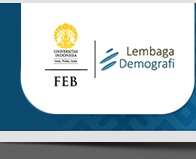Jurnal Ekonomi Kependudukan dan Keluarga
Abstract
One of the social problems in West Nusa Tenggara Province, Indonesia is high rates of under-registered child marriage. Marriage registration is an obligation in marriage legislation in Indonesia and also an issue of human rights. Studies on marriage registration are very limited in Indonesia. Therefore, this study aims to examine the critical determinants that affect the provision of having a marriage certificate in case of child marriage in West Nusa Tenggara, Indonesia. The study used the 2022 Indonesia National Socio-Economic Survey (SUSENAS) data. The analysis was done using descriptive statistics and binary logistic regression. The results indicate that the variables included in the analysis are statistically significant. The odds ratio indicates that women are more likely to register their marriage than men. It is more likely that people who lived in the urban areas, people who married after 16 years, people who had been educated in senior high school and above, people who were employed, and people who accessed the internet/social media were more likely to register their marriage. People who had not joined Bank Accounts, who came from rich families, and who had social insurance from the government were in line with those who did not register their marriage (odd ratio=1). The finding in this study concluded that gender, age at marriage, place of residence, wealth index, education, working status, joint bank account, media exposure, and receiving social insurance from the government are the leading determinants of registered child marriage in West Nusa Tenggara, Indonesia. Furthermore, there is a need to educate the importance of registering a marriage to society more intensively and the policy makers should campaign awareness of existing marriage certificates.
Recommended Citation
Yusnissa, Hertina; Nooraeni, Rani; and Lestariningsih, Eni
(2024)
"I'm Married too Young: How To Pursue Legal Marriage?,"
Jurnal Ekonomi Kependudukan dan Keluarga: Vol. 1:
No.
1, Article 1.
DOI: 10.7454/jekk.v1i1.1000
Available at:
https://scholarhub.ui.ac.id/jekk/vol1/iss1/1





